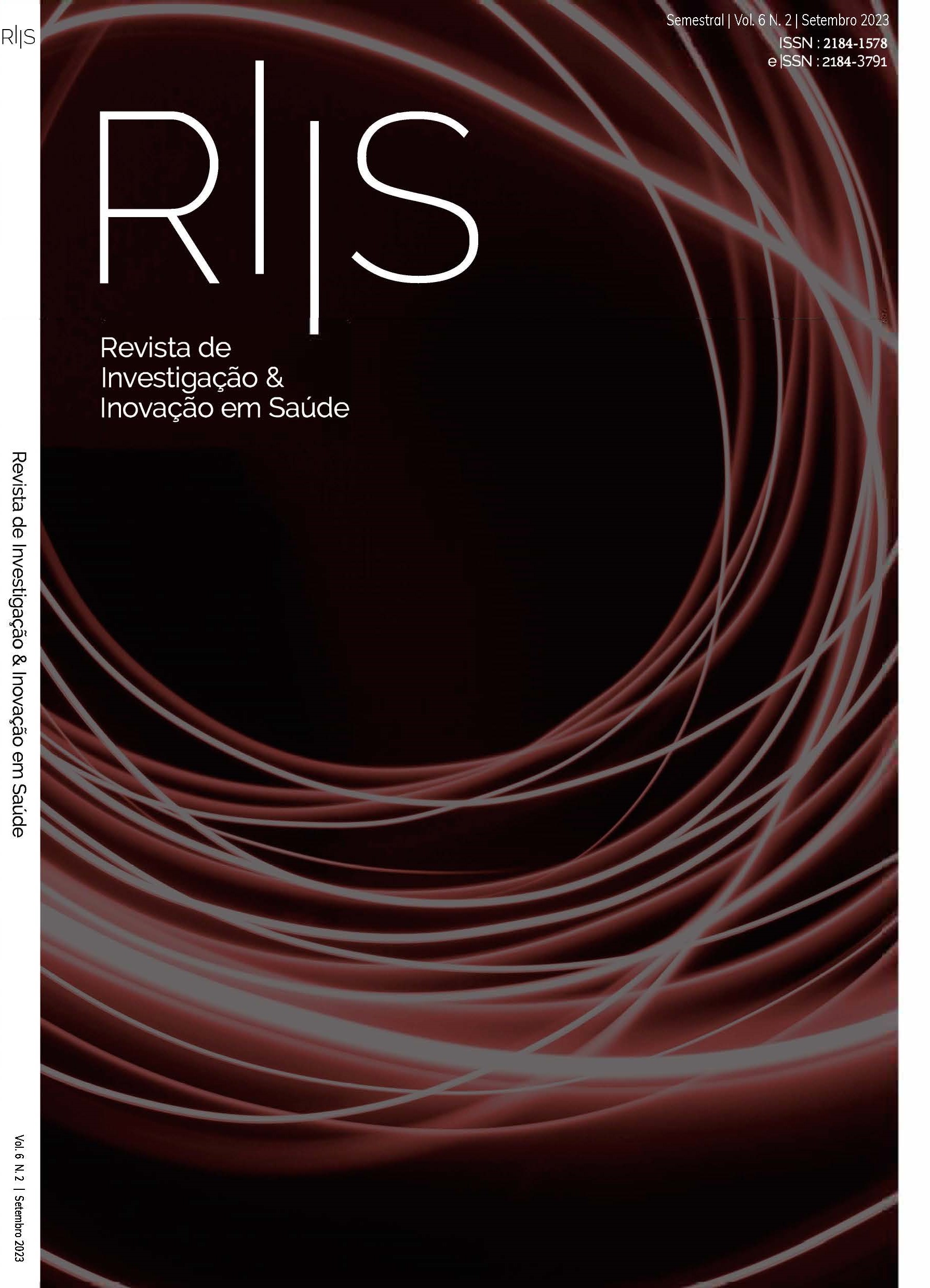Machine learning tools in chronic disease management: scoping review
DOI:
https://doi.org/10.37914/riis.v7i1.359Keywords:
Machine Learning, Chronic Disease, NursingAbstract
Background: the implementation of technologies based on Artificial Intelligence (AI) in the health sector, in particular machine learning (ML), has had a significant transformational effect. Their use improves disease prediction, classification and diagnosis, benefiting both users and healthcare professionals. Objective: to map ML tools for chronic disease management, with relevance to nursing care for people with chronic diseases. Methodology: scoping review based on the recommendations of the Joanna Briggs Institute. The MEDLINE Complete via PUBMED, CINAHL Complete via EBSCO, SCOPUS, OpenGrey, RCAAP and DART-Europe databases were used, with no time limit. Results: seven articles were included and 9 AI tools associated with chronic disease management were identified, namely chronic kidney disease, chronic obstructive pulmonary disease, hepatitis C, heart failure and chronic venous insufficiency. Conclusion: the tools identified have the potential to contribute to improving nursing care, particularly in identifying risk factors associated with chronic diseases, detecting exacerbations early, continuously monitoring and evaluating the effectiveness of treatment and supporting clinical decision-making.
References
Alzghoul, B. N., Reddy, R., Chizinga, M., Innabi, A., Zou, B., Papierniak, E. S., & Faruqi, I. (2020). Pulmonary Embolism in Acute Asthma Exacerbation: Clinical Characteristics, Prediction Model and Hospital Outcomes. Lung, 198(4), 661–669. https://doi.org/10.1007/s00408-020-00363-0 DOI: https://doi.org/10.1007/s00408-020-00363-0
Battineni, G., Sagaro, G. G., Chinatalapudi, N., & Amenta, F. (2020). Applications of machine learning predictive models in the chronic disease diagnosis. Journal of Personalized Medicine, 10(2). https://doi.org/10/ghb3w5 DOI: https://doi.org/10.3390/jpm10020021
Chan, K. S., Liang, S., Cho, Y. T., Chan, Y. M., Tan, A. H. M., Muthuveerappa, S., Lai, T. P., Goh, C. C., Joseph, A., Hong, Q., Yong, E., Zhang, L., Chong, L. R. C., Tan, G. W. L., Chandrasekar, S., & Lo, Z. J. (2022). Clinical validation of a MACHINE‐LEARNING ‐based handheld 3‐DIMENSIONAL infrared wound imaging device in venous leg ulcers. International Wound Journal, 19(2), 436–446. https://doi.org/10.1111/iwj.13644 DOI: https://doi.org/10.1111/iwj.13644
Chatterjee, A., Gerdes, M. W., & Martinez, S. G. (2020). Identification of Risk Factors Associated with Obesity and Overweight—A Machine Learning Overview. Sensors, 20(9), 2734. https://doi.org/10.3390/s20092734 DOI: https://doi.org/10.3390/s20092734
Corporation for Digital Scholarship and Roy Rosenzweig Center for & History and New Media. (2021). Zotero | Your personal research assistant (Zotero 5.0.94). https://www.zotero.org/
Du, A., Shi, X., Guo, X., Pei, Q., Ding, Y., Zhou, W., Lu, Q., & Shi, H. (2021). Assessing the Adequacy of Hemodialysis Patients via the Graph-Based Takagi-Sugeno-Kang Fuzzy System. Computational and Mathematical Methods in Medicine, 2021, 1–11. https://doi.org/10.1155/2021/9036322 DOI: https://doi.org/10.1155/2021/9036322
Habehh, H., & Gohel, S. (2021). Machine Learning in Healthcare. Current Genomics, 22(4), 291–300. https://doi.org/10/grvfd6 DOI: https://doi.org/10.2174/1389202922666210705124359
Helm, M., Schwigoz, A., Haeberle, H., Karnuta, J., Schaffer, J., Krebs, V., Ramkumar, P. (2020). The Use of Technology in Orthopaedic Surgery—Intraoperative and Post-Operative Management. (S. Science, Ed.) Machine Learning and Artificial Intelligence: Definitions, Applications, and Future Directions, pp. 69-76. https://doi.org/10.1007/s12178-020-09600-8 DOI: https://doi.org/10.1007/s12178-020-09600-8
Jimma, B. L. (2023). Artificial intelligence in healthcare: A bibliometric analysis. Telematics and Informatics Reports, 9, 100041. https://doi.org/10.1016/j.teler.2023.100041 DOI: https://doi.org/10.1016/j.teler.2023.100041
Jørgensen, T. S. H., Allore, H., Elman, M. R., Nagel, C., & Quiñones, A. R. (2022). The importance of chronic conditions for potentially avoidable hospitalizations among non-Hispanic Black and non-Hispanic White older adults in the US: A cross-sectional observational study. BMC Health Services Research, 22(1), 468. https://doi.org/10.1186/s12913-022-07849-y DOI: https://doi.org/10.1186/s12913-022-07849-y
Liao, H., Tang, M., Luo, L., Li, C., Chiclana, F., & Zeng, X.-J. (2018). A Bibliometric Analysis and Visualization of Medical Big Data Research. Sustainability, 10(1), Art. 1. https://doi.org/10/gc4c4w DOI: https://doi.org/10.3390/su10010166
Lobo, L. (2018). Inteligência artificial, o Futuro da Medicina e a Educação Médica. (R. b. med., Ed.) Artificial Intelligence, the Future of Medicine and Medical Education, 42(3), pp. 3-8. http://dx.doi.org/10.1590/1981-52712015v42n3RB20180115EDITORIAL1 DOI: https://doi.org/10.1590/1981-52712015v42n3rb20180115editorial1
Munn, Z., Peters, M. D. J., Stern, C., Tufanaru, C., McArthur, A., & Aromataris, E. (2018). Systematic review or scoping review? Guidance for authors when choosing between a systematic or scoping review approach. BMC Medical Research Methodology, 18(1), 143. https://doi.org/10/gfq8w2 DOI: https://doi.org/10.1186/s12874-018-0611-x
Nakayama, J. Y., Ho, J., Cartwright, E., Simpson, R., & Hertzberg, V. S. (2021). Predictors of progression through the cascade of care to a cure for hepatitis C patients using decision trees and random forests. Computers in Biology and Medicine, 134, 104461. https://doi.org/10.1016/j.compbiomed.2021.104461 DOI: https://doi.org/10.1016/j.compbiomed.2021.104461
Organização Cooperação Desenvolvimento Económico (OCDE). (2021). Estado da Saúde na UE, Portugal, Perfil de saúde do país 2021. OECD e WHO. Organização para Cooperação e Desenvolvimento Económico.
Organização Pan-Americana de Saúde (OPAS). (2020). OPAS 120 Noticias. (O. P.-A. Saúde, Produtor) Obtido em 21 de fevereiro de 2023, de OMS revela principais causas de morte e incapacidade em todo o mundo entre 2000 e 2019: https://www.paho.org/pt/noticias/9-12-2020-oms-revela-principais-causas-morte-e-incapacidade-em-todo-mundo-entre-2000-e
Peters, M. D. J., Godfrey, C., McInerney, P., Khalil, H., Larsen, P., Marnie, C., Pollock, D., Tricco, A. C., & Munn, Z. (2022). Best practice guidance and reporting items for the development of scoping review protocols. JBI Evidence Synthesis, 20(4), 953. https://doi.org/10/gq4nkn DOI: https://doi.org/10.11124/JBIES-21-00242
Rajkomar, A., Dean, J., & Kohane, I. (2019). Machine Learning in Medicine. The New England Journal of Medicine, 380(14), 1347–1358. https://doi.org/10/gfzk8r DOI: https://doi.org/10.1056/NEJMra1814259
Raymond, L., Castonguay, A., Doyon, O., & Paré, G. (22 de março de 2022). Applied Nursing Reasearch. (E. Inc., Ed.) Nurse practitioners' involvement and experience with AI-based health technologies: A systematic review, 66(0897-1897), pp. 1-8. doi:https://doi.org/10.1016/j.apnr.2022.151604 DOI: https://doi.org/10.1016/j.apnr.2022.151604
Santos, A., & Campos, R. (2022). Preservação dos direitos humanos no uso de técnica de machine learning na efetivação de políticas públicas em saúde global. Em A. Santos, & R. Campos, Ciências da Saúde: Desafios, Perspectivas e Possibilidades (p. 154). Científica Digital. https://10.37885/220509049 DOI: https://doi.org/10.37885/220509049
Simeone, O. (2018). A Very Brief Introduction to Machine Learning With Applications to Communication Systems. IEEE Transactions on Cognitive Communications and Networking, 4(4), 648–664. https://doi.org/10/gf6ktd DOI: https://doi.org/10.1109/TCCN.2018.2881442
Su, D., Zhang, X., He, K., Chen, Y., & Wu, N. (2022). Individualized prediction of chronic kidney disease for the elderly in longevity areas in China: Machine learning approaches. Frontiers in Public Health, 10, 998549. https://doi.org/10.3389/fpubh.2022.998549 DOI: https://doi.org/10.3389/fpubh.2022.998549
Tricco, A. C., Lillie, E., Zarin, W., O’Brien, K. K., Colquhoun, H., Levac, D., Moher, D., Peters, M. D. J., Horsley, T., Weeks, L., Hempel, S., Akl, E. A., Chang, C., McGowan, J., Stewart, L., Hartling, L., Aldcroft, A., Wilson, M. G., Garritty, C., … Straus, S. E. (2018). PRISMA Extension for Scoping Reviews (PRISMA-ScR): Checklist and Explanation. Annals of Internal Medicine, 169(7), 467–473. https://doi.org/10/gfd8vk DOI: https://doi.org/10.7326/M18-0850
Downloads
Published
How to Cite
Issue
Section
License
Copyright (c) 2023 Igor Soares-Pinto, Marta Sofia Ferreira Sá, Ana Margarida Martins Bastos Alves, Maria Teresa Barbosa Pinto Sousa, Ana Vanessa Fernandes Carvalho, Cátia Moreira

This work is licensed under a Creative Commons Attribution 4.0 International License.















